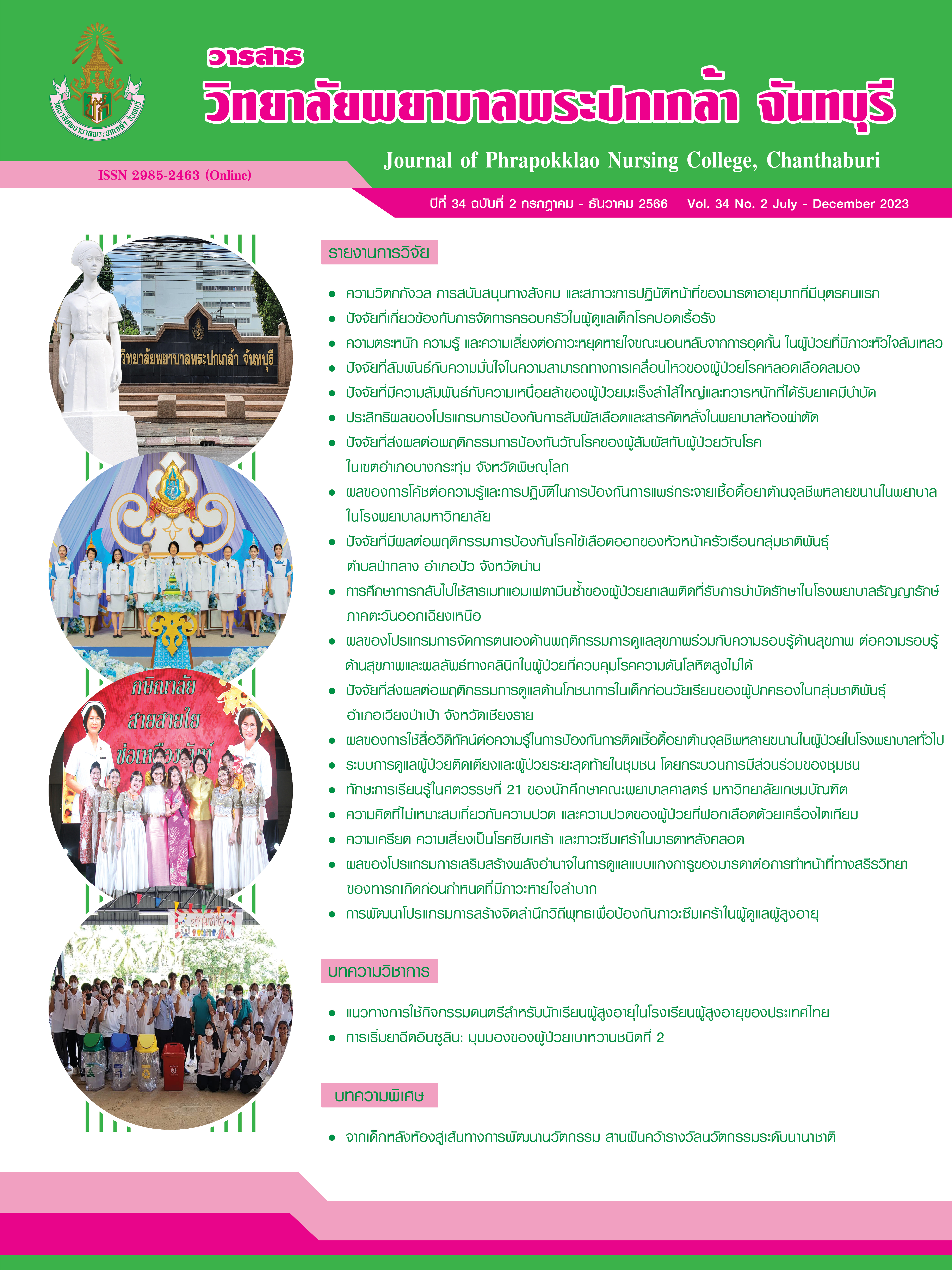The Development of Buddhist Awareness Enhancement Program for Preventing Depression among Caregivers of the Elderly
Keywords:
Buddhist awareness, Depression, Caregivers of the elderlyAbstract
This research and development aimed to develop the Buddhist awareness enhancement program for preventing depression among caregivers of the elderly and examine the effectiveness of the program. The three phases of this research included: 1) phase 1 situation analysis, the samples consisted of 15 caregivers of the elderly; 2) phase 2 program development and feasibility study, the samples consisted of 15 caregivers of the elderly; and 3) phase 3 program evaluation, the samples consisted of caregivers of the elderly who were divided into an experimental group (n = 30) and a control group (n = 30). The research instruments included the semi-structured interview form, the Buddhist awareness enhancement program for preventing depression among caregivers of the elderly, the feasibility of program implementation questionnaire with a reliability of .78, the demographic questionnaire, the 9-question depression assessment form (9Q), the Buddhist happiness measure with a reliability of .88, and the perceived Buddhist awareness enhancement questionnaire with a reliability of .85. The implementation and data collection were conducted from April 2018 to January 2019. Data were analyzed using frequency, percentage, mean, standard deviation, paired t-test, independent t-test, and content analysis.
The research results revealed that 1) having positive thinking and purpose in life can prevent depression among caregivers of the elderly; 2) caregivers of the elderly indicated that the level of feasibility was high (M = 48.51, SD = 4.41); 3) after the experiment, the experimental group had statistically significantly lower mean score of depression than that of before the experiment (t = 6.530, p < .001); and 4) after the experiment, the experimental group had statistically significantly higher mean scores of happiness and perceived Buddhist awareness enhancement than those of before the experiment (t = 11.865, p < .001 and t = 21.586, p < .001, respectively) and those of the control group (t = 3.548, p < .01 and t = 2.048, p < .05, respectively).
This research suggests that health care providers who care for the elderly should apply this Buddhist awareness enhancement program for preventing depression among caregivers of the elderly to care for caregivers of the elderly. This will help reduce depression among caregivers of the elderly.
References
กนกพร แสงศรีจันทร์. (ม.ป.ป.). ปัจจัยด้านความเชื่อมั่นและความไว้วางใจ ด้านการรับรู้คุณค่า และด้านการยอมรับเทคโนโลยี ส่งผลต่อการตัดสินใจปฏิบัติธรรมผ่านคอร์สออนไลน์ ของธรรมสถานมูลนิธิพุทธะมหาเมตตา จังหวัดพระนครศรีอยุธยา. สืบค้นจาก https://mmm.ru.ac.th/MMM/IS/sat18/6314060002.pdf
กรมสุขภาพจิต กระทรวงสาธารณสุข. (2545). ดัชนีชี้วัดความสุขคนไทย. สืบค้นจาก https://dmh.go.th/test/download/files/thi15.pdf
กรมสุขภาพจิต กระทรวงสาธารณสุข. (2553). แนวทางการจัดการโรคซึมเศร้าสำหรับแพทย์เวชปฏิบัติทั่วไปในสถานบริการระดับปฐมภูมิและทุติยภูมิ. สืบค้นจาก https://www.thaidepression.com/www/news54/CPG-MDD-GP.pdf
กองยุทธศาสตร์สาธารณสุขและสิ่งแวดล้อม กรุงเทพมหานคร. (2561). รายงานข้อมูลผู้สูงอายุของกรุงเทพมหานคร จากฐานประชากรในระบบทะเบียนราษฎร ณ เดือนธันวาคม 2561 และเปรียบเทียบกับข้อมูล ณ เดือนธันวาคม 2560. สืบค้นจาก https://webportal.bangkok.go.th/upload/user/00000132/download/22_02_62fullpaper.pdf
ไกรฤกษ์ ศิลาคม, และหัสดิน แก้ววิชิต. (2560). ผลของการเจริญสติแบบเคลื่อนไหวต่อสุขภาพจิตและความฉลาดทางอารมณ์ของนักศึกษามหาวิทยาลัยราชภัฏอุดรธานี. วารสารมหาวิทยาลัยนครพนม, 7(1), 16–24.
ฐิตวันต์ หงษ์กิตติยานนท์, อารยา ทิพย์วงศ์, ลักขณา ยอดกลกิจ, และสายสมร เฉลยกิตติ. (2562). ผลของโปรแกรมการรับรู้ความสามารถของตนเองต่อพฤติกรรมหลีกเลี่ยงการใช้สารเสพติดของเยาวชน. เวชสารแพทย์ทหารบก, 72(1), 33–40.
ไพรัตน์ ชมภูบุตร, เกษราภรณ์ เคนบุปผา, สุพัตรา สุขาวห, จินตนา ลี้จงเพิ่มพูน, และหทัยรัตน์ สายมาอินทร์. (2565). การพัฒนาและผลของโปรแกรมการจัดการตนเองด้วยการเจริญสติตระหนักรู้ความคิดเพื่อป้องกันการกลับเป็นซ้ำของผู้ป่วยโรคซึมเศร้า. วารสารการพยาบาลจิตเวชและสุขภาพจิต, 36(3), 117–140.
มณีรัตน์ ชาวบล, วิราพรรณ วิโรจน์รัตน์, และดวงรัตน์ วัฒนกิจไกรเลิศ. (2565). ปัจจัยทำนายภาวะซึมเศร้าของผู้ดูแลผู้สูงอายุที่มีภาวะพึ่งพิง. วารสารพยาบาลศาสตร์, 40(3), 90–104.
มาริสา อุทยาพงษ์. (2560). การประยุกต์ใช้การเจริญสติ เพื่อป้องกันผู้ที่มีภาวะซึมเศร้า. วารสารบัณฑิตศึกษาปริทรรศน์, 13(พิเศษ 2), 109–122.
มูลนิธิสถาบันวิจัยและพัฒนาผู้สูงอายุไทย. (2561). สถานการณ์ผู้สูงอายุไทย พ.ศ. 2560. กรุงเทพฯ: โรงพิมพ์เดือนตุลา.
รัตน์ศิริ ทาโต. (2561). การวิจัยทางพยาบาลศาสตร์: แนวคิดสู่การประยุกต์ใช้ (พิมพ์ครั้งที่ 4). กรุงเทพฯ: โรงพิมพ์แห่งจุฬาลงกรณ์มหาวิทยาลัย.
วริศดา พุกแก้ว, พระมหาหรรษา ธมฺมหาโส, และขันทอง วัฒนะประดิษฐ์. (2563). รูปแบบการพัฒนาสติเพื่อเสริมสร้างสันติสุขภาวะสําหรับผู้สูงวัยที่มีภาวะพึ่งพิง. วารสารสันติศึกษาปริทรรศน์ มจร, 8(เพิ่มเติม), 108–120.
ศิวพร ชุ่มเย็น, และศิวิไลซ์ วนรัตน์วิจิตร. (2566). ปัจจัยที่ส่งผลต่อการปฏิบัติตามบทบาทการทำงานของผู้ดูแลผู้สูงอายุที่มีภาวะพึ่งพิง จังหวัดอุตรดิตถ์. วารสารวิทยาลัยพยาบาลพระปกเกล้า จันทบุรี, 34(1), 158–171.
สมจิตร เสริมทองทิพย์. (2560). ผลของโปรแกรมการบำบัดทางปัญญาบนพื้นฐานของสติต่อภาวะซึมเศร้าในผู้เป็นเบาหวาน (วิทยานิพนธ์ปริญญามหาบัณฑิต). ชลบุรี: มหาวิทยาลัยบูรพา.
สมพร กันทรดุษฎี-เตรียมชัยศรี. (2554). สมาธิบำบัดแบบ SKT รักษาสารพัดโรคได้ด้วยตนเอง. กรุงเทพฯ: ปัญญาชน.
สายพิณ เกษมกิจวัฒนา, และปิยะภรณ์ ไพรสนธิ์. (2557). ญาติผู้ดูแลผู้ป่วยเรื้อรัง: กลุ่มเสี่ยงที่ไม่ควรมองข้าม. วารสารสภาการพยาบาล, 29(4), 22–31.
Bandura, A. (1997). Self-efficacy: The exercise of control. New York: W.H. Freeman and Company.
Orem, D. E. (2001). Nursing concepts of practice (6th ed.). St Louis: Mosby.
Downloads
Published
How to Cite
Issue
Section
Categories
License
Copyright (c) 2023 Journal of Phrapokklao Nursing College, Chanthaburi

This work is licensed under a Creative Commons Attribution-NonCommercial-NoDerivatives 4.0 International License.
เนื้อความ ข้อมูล และรายการอ้างอิงที่ผู้เขียนใช้ในการเขียนบทความเพื่อลงตีพิมพ์ในวารสารวิทยาลัยพยาบาลพระปกเกล้า จันทบุรี ถือเป็นความคิดเห็นและความรับผิดชอบของผู้เขียน คณะผู้จัดทำวารสารไม่จำเป็นต้องเห็นพ้องด้วยหรือร่วมรับผิดชอบ
บทความที่ได้รับการลงตีพิมพ์ในวารสารวิทยาลัยพยาบาลพระปกเกล้า จันทบุรี ถือเป็นลิขสิทธิ์ของวารสารวิทยาลัยพยาบาลพระปกเกล้า จันทบุรี หากหน่วยงานหรือบุคคลใดต้องการนำส่วนหนึ่งหรือทั้งหมดของบทความไปเผยแพร่ต่อเพื่อวัตถุประสงค์ใด ๆ จะต้องได้รับอนุญาตจากบรรณาธิการวารสารก่อน



